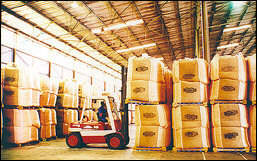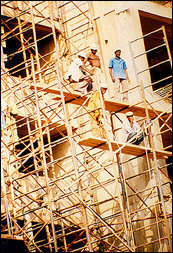 The Industrial sector The Industrial sector |

Côte d'Ivoire has so far been considered as an essentially agricultural country. The government is understood to be involved in an industrialisation marked by on-the-spot processing of agricultural products. Like the Asian countries which became developed by focusing on industrialisation, Côte d'Ivoire has set forth 25 years, that is within a generation, as the period by which it hopes to attain development. According to the Minister of Industry and Tourism, Mr. Affi N'Guessan, " We are in a political context which we hope to rationalise as much as possible so as to offer maximum guarantees to foreign investors ".
Primarily, the priorities of the Government in terms of industrial strategy is the processing of agricultural or mining raw materials. Côte d'Ivoire is replete with huge mining, petroleum and gas resources and these resources need to be processed locally albeit into finished or semi-finished products. To this end, Chinese businessmen will soon build a big fertiliser plant which will use a natural gas power supply and the project will have a production capacity of 500 000 tonnes per year. " All this requires that we refurbish the existing production system by up-grading it and introducing new technology and technological innovations " the Minister added.
Other partners, especially the Germans, plan to manufacture methanol from natural gas. The agro-industry is now developing: from 100,000 tonnes of cocoa processed in 1992-1993, Cote d'Ivoire has now attained a level of 300,000 tonnes. The objective is to reach a 50% processing of production in two years time. From 15,000 tonnes of coffee processed in 1993, 27,500 tonnes now crushed thanks to the doubling of the capacity of existing industries. Nestlé alone processes 17% of the total 24% coffee on the spot representing nearly 71% of processed coffee.
Côte d'Ivoire intends to become a newly industrialised country in 25 years time. For this, the Government resolved to promote foreign investments by organising exhibitions and fairs. The aim is to initially show what the country has to offer industrially and then, get the investors to become interested in its industrial development. It was with this in mind that the Ivorian industrial fair opened its doors to participants for three days last May.
Côte d'Ivoire exports manufactured products in the sub-region, especially within the West African Economic and Monetary Union (UEMOA) zone which is a market of 60 million consumers. The West African common market will enter into force with the establishment of the customs union in January 2000. To this end, all UEMOA States would have a 20% customs duty rate and allow free circulation of goods in the zone.
The agro-allied industry remains quite developed compared to the chemical or heavy machinery industry. For some months now, an American investment move is in motion in the area of agricultural product processing. The Cargill group has just made its entry into the market. It now crushes 350,000 tonnes of cocoa annually in its factories scattered all around the world, thus making it the current world leader. Cargill has built a cocoa packaging, processing and storage outfit with a capacity of 1,000 tonnes per day in San Pedro (380 km south east). This American giant is building a cocoa processing factory, MICAO (Moulin Ivoiriens du Cacao) in Abidjan-Yopougon. The factory which will have a capacity of 65,000 tonnes, will become operational in the summer of 2000 and will provide jobs to hundreds.
Besides, other industrial firms elsewhere are bringing
in greater added value. This is the case, for instance,
with Sapled which is involved in the processing
of dairy products. The company is another example
of an agro-allied industry. It was incorporated
in 1985 with a share capital of CFA F 220 million
and now has a turnover of CFA F 8 billion. At the
end of the 1998 financial year, the company recorded
a turnover of CFA F 5.4 billion as against CFA F
3.4 billion in 1997. Its successive investments
saw the product range expanded since SAPLED was
essentially involved in butter and margarine production.
For example, in 1998, it bought over GELTI, a dairy
company, and in 1999 it was the turn of Laitiere
Ivoirienne to come under the control of SAPLED.
This move will enable it acquire know-how and a
new portfolio of clients. "In 1998 the market
particularly witnessed a significant boost in yoghurt,
ice cream and juice production" says Thomas
Iwankow, the company's Marketing Manager. He also
stated that this increase in turnover was due mainly
to the expansion of all logistics associated with
distribution. Sapled holds 80% of the market
for butter, 50% for juice, 45% for ice cream and
30% for yoghurt. |

On his part, the Managing Director announced new projects, especially with respect to condensed milk which has enormous potentialities. "Our objective is to increase our share of the market by selling quality products at prices affordable by a large number of people" the Managing Director declares. To this end, the company which is already exporting to countries in the sub-region such as Ghana, Burkina Faso and Mali, would want to capture the market in the entire franc zone. "Our export volume to these countries alone represents 60% of our total sales" states Mr. Abdallah Sifaoui. In its sector, SAPLED also has competitors namely Eurolait (the Eurofind group) and Saprolait for yoghurt, Casmivoire (the SIFCA group) and Blohorn (Unilever) for butter.
According to the Managing Director, it is the proximity policy both in terms of distribution as in prices that gives the company an edge on the market. For its importation of raw materials, the company almost always turns to Great Britain rather than to France. "We would be more interested in establishing contacts in this aspect than in the area of industrial equipment" so desires Abdallah Sifaoui.
Africa, and indeed Côte d'Ivoire which represents the economic heartbeat of the sub-region, could clearly offer interesting opportunities to American businessmen. SAPLED is now in close relations with an American company (a fall-out of the buying over of GELTI in 1998). "We have acquired the licence for the Tampico trade mark granted by Marbo, Inc. in Chicago" Thomas Iwankow added. As part of the broadening of its contacts with American companies, a SAPLED representative was present at the World-wide Food Expo 99 which took place last October in Chicago.

Besides the agro-allied industry, timber is becoming important with wood processing by saw-mills based in the various production zones. This over-exploitation of the Ivorian forest is worrisome to the Société de Dévéloppement de la Fôret (SODEFOR) (Forestry Development Agency). Established 33 years ago, this company oversees the entire reserve forests and reaforestation. Today, forest resources are estimated at 3.5 million hectares compared to 15 million hectares in 1996. " Thanks to Sodefor, Côte d'Ivoire now has 115 000 hectares of reforested land ", asserts Director General of Sodefor, Mr Jean-Claude Anoh.
In order to better protect the Ivorian forest, the Government decided in 1997 to ban timber log exports. " We improved local processing in the area of wood industries so that operators of the sector could go further in the processing chain in order to consume less resources ", hints Jean-Claude Anoh. In the struggle for environmental protection, the Government will launch a programme aimed at sustainable management of reserved forests. All this contribute to the country's economic development. A development centered more and more on the construction of infrastructures. |

